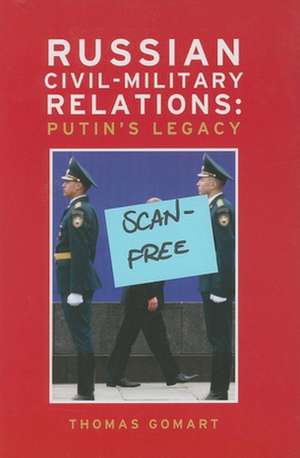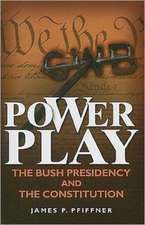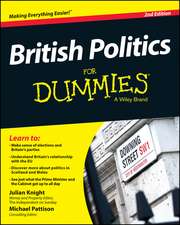Russian Civil-Military Relations: Putin's Legacy
Autor Thomas Gomarten Limba Engleză Paperback – 9 iul 2008
"This perceptive and well-informed study highlights the continuity of the Russian (civilian and military) security community's distrust of the outside world, fueled by NATO enlargement. Communism may be dead in Russia, but the obsession with 'threats' continues, rallying the population and keeping security elites in power. This makes Russia an uncomfortable world player to live with. A must read."—Beatrice Heuser, professor and chair of International Relations, School of Politics and International Relations, University of Reading (UK)
As Russia reasserts itself on the international stage, the relationship between its civilian and military spheres remains one of the determining factors in the organization of political power. Thomas Gomart's Russian Civil-Military Relations: Putin's Legacy looks beyond traditional dualism between the Kremlin and the military, introducing the role of the security services in Russian power distribution. With the support of the siloviki (security service) and justification through the fight against "international terrorism," Putin worked throughout his administration to reestablish presidential control over the military. As Russia transitions to Dmitry Medvedev's presidency, it is important to not only review the Putin presidency, which has given many of the country's institutions their shape, but also to reach back further into post-communist and Soviet history for an understanding of the realities of today.
Russian Civil-Military Relations provides crucial analysis of the nature and evolution of the balance between civilian and military institutions. These relations will continue to influence regime development, security policy, and societal attitudes that build from Putin's Russia to Medvedev's administration and into the future.
As Russia reasserts itself on the international stage, the relationship between its civilian and military spheres remains one of the determining factors in the organization of political power. Thomas Gomart's Russian Civil-Military Relations: Putin's Legacy looks beyond traditional dualism between the Kremlin and the military, introducing the role of the security services in Russian power distribution. With the support of the siloviki (security service) and justification through the fight against "international terrorism," Putin worked throughout his administration to reestablish presidential control over the military. As Russia transitions to Dmitry Medvedev's presidency, it is important to not only review the Putin presidency, which has given many of the country's institutions their shape, but also to reach back further into post-communist and Soviet history for an understanding of the realities of today.
Russian Civil-Military Relations provides crucial analysis of the nature and evolution of the balance between civilian and military institutions. These relations will continue to influence regime development, security policy, and societal attitudes that build from Putin's Russia to Medvedev's administration and into the future.
Preț: 104.95 lei
Nou
Puncte Express: 157
Preț estimativ în valută:
20.08€ • 20.97$ • 16.58£
20.08€ • 20.97$ • 16.58£
Carte disponibilă
Livrare economică 25 martie-08 aprilie
Preluare comenzi: 021 569.72.76
Specificații
ISBN-13: 9780870032417
ISBN-10: 0870032410
Pagini: 120
Dimensiuni: 152 x 229 x 10 mm
Greutate: 0.23 kg
Editura: Brookings Institution Press
Colecția Carnegie Endowment for Int'l Peace
ISBN-10: 0870032410
Pagini: 120
Dimensiuni: 152 x 229 x 10 mm
Greutate: 0.23 kg
Editura: Brookings Institution Press
Colecția Carnegie Endowment for Int'l Peace
Notă biografică
Thomas Gomart is director of the Russia/NIS Center at the French Institute for nternational Relations (IFRI) in Paris and lectures on international affairs and geopolitics at the Special Military School of Saint-Cyr Coëtquidan. He has been Lavoisier Fellow at the Moscow State Institute for International Relations, visiting fellow at the Institute for Security Studies, Paris, and Marie Curie Fellow at the Department of War Studies, King's College, London.
Descriere
"This perceptive and well-informed study highlights the continuity of the Russian (civilian and military) security community's distrust of the outside world, fueled by NATO enlargement. Communism may be dead in Russia, but the obsession with 'threats' continues, rallying the population and keeping security elites in power. This makes Russia an uncomfortable world player to live with. A must read."—Beatrice Heuser, professor and chair of International Relations, School of Politics and International Relations, University of Reading (UK)
As Russia reasserts itself on the international stage, the relationship between its civilian and military spheres remains one of the determining factors in the organization of political power. Thomas Gomart's Russian Civil-Military Relations: Putin's Legacy looks beyond traditional dualism between the Kremlin and the military, introducing the role of the security services in Russian power distribution. With the support of the siloviki (security service) and justification through the fight against "international terrorism," Putin worked throughout his administration to reestablish presidential control over the military. As Russia transitions to Dmitry Medvedev's presidency, it is important to not only review the Putin presidency, which has given many of the country's institutions their shape, but also to reach back further into post-communist and Soviet history for an understanding of the realities of today.
Russian Civil-Military Relations provides crucial analysis of the nature and evolution of the balance between civilian and military institutions. These relations will continue to influence regime development, security policy, and societal attitudes that build from Putin's Russia to Medvedev's administration and into the future.
As Russia reasserts itself on the international stage, the relationship between its civilian and military spheres remains one of the determining factors in the organization of political power. Thomas Gomart's Russian Civil-Military Relations: Putin's Legacy looks beyond traditional dualism between the Kremlin and the military, introducing the role of the security services in Russian power distribution. With the support of the siloviki (security service) and justification through the fight against "international terrorism," Putin worked throughout his administration to reestablish presidential control over the military. As Russia transitions to Dmitry Medvedev's presidency, it is important to not only review the Putin presidency, which has given many of the country's institutions their shape, but also to reach back further into post-communist and Soviet history for an understanding of the realities of today.
Russian Civil-Military Relations provides crucial analysis of the nature and evolution of the balance between civilian and military institutions. These relations will continue to influence regime development, security policy, and societal attitudes that build from Putin's Russia to Medvedev's administration and into the future.






